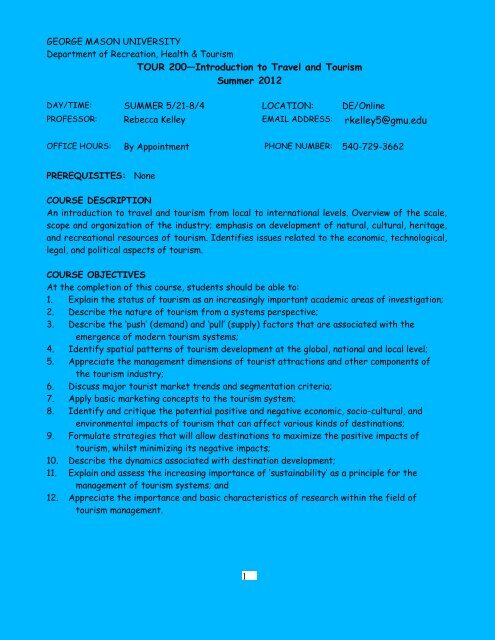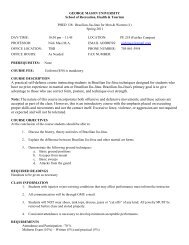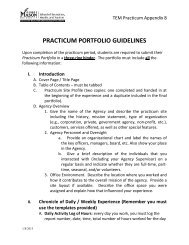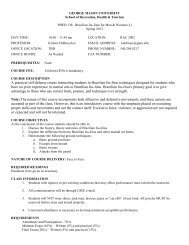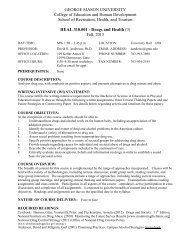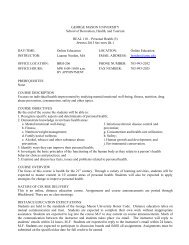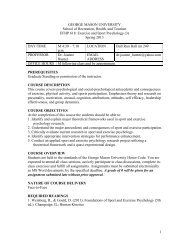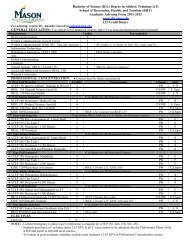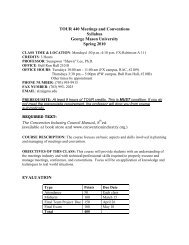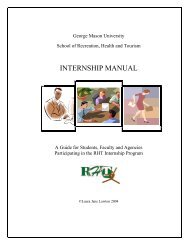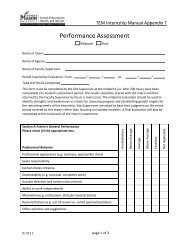Syllabus - School of Recreation, Health, and Tourism - George ...
Syllabus - School of Recreation, Health, and Tourism - George ...
Syllabus - School of Recreation, Health, and Tourism - George ...
You also want an ePaper? Increase the reach of your titles
YUMPU automatically turns print PDFs into web optimized ePapers that Google loves.
GEORGE MASON UNIVERSITY<br />
Department <strong>of</strong> <strong>Recreation</strong>, <strong>Health</strong> & <strong>Tourism</strong><br />
TOUR 200—Introduction to Travel <strong>and</strong> <strong>Tourism</strong><br />
Summer 2012<br />
DAY/TIME: SUMMER 5/21-8/4 LOCATION: DE/Online<br />
PROFESSOR: Rebecca Kelley EMAIL ADDRESS: rkelley5@gmu.edu<br />
OFFICE HOURS: By Appointment PHONE NUMBER: 540-729-3662<br />
PREREQUISITES: None<br />
COURSE DESCRIPTION<br />
An introduction to travel <strong>and</strong> tourism from local to international levels. Overview <strong>of</strong> the scale,<br />
scope <strong>and</strong> organization <strong>of</strong> the industry; emphasis on development <strong>of</strong> natural, cultural, heritage,<br />
<strong>and</strong> recreational resources <strong>of</strong> tourism. Identifies issues related to the economic, technological,<br />
legal, <strong>and</strong> political aspects <strong>of</strong> tourism.<br />
COURSE OBJECTIVES<br />
At the completion <strong>of</strong> this course, students should be able to:<br />
1. Explain the status <strong>of</strong> tourism as an increasingly important academic areas <strong>of</strong> investigation;<br />
2. Describe the nature <strong>of</strong> tourism from a systems perspective;<br />
3. Describe the ‘push’ (dem<strong>and</strong>) <strong>and</strong> ‘pull’ (supply) factors that are associated with the<br />
emergence <strong>of</strong> modern tourism systems;<br />
4. Identify spatial patterns <strong>of</strong> tourism development at the global, national <strong>and</strong> local level;<br />
5. Appreciate the management dimensions <strong>of</strong> tourist attractions <strong>and</strong> other components <strong>of</strong><br />
the tourism industry;<br />
6. Discuss major tourist market trends <strong>and</strong> segmentation criteria;<br />
7. Apply basic marketing concepts to the tourism system;<br />
8. Identify <strong>and</strong> critique the potential positive <strong>and</strong> negative economic, socio-cultural, <strong>and</strong><br />
environmental impacts <strong>of</strong> tourism that can affect various kinds <strong>of</strong> destinations;<br />
9. Formulate strategies that will allow destinations to maximize the positive impacts <strong>of</strong><br />
tourism, whilst minimizing its negative impacts;<br />
10. Describe the dynamics associated with destination development;<br />
11. Explain <strong>and</strong> assess the increasing importance <strong>of</strong> ‘sustainability’ as a principle for the<br />
management <strong>of</strong> tourism systems; <strong>and</strong><br />
12. Appreciate the importance <strong>and</strong> basic characteristics <strong>of</strong> research within the field <strong>of</strong><br />
tourism management.<br />
1
COURSE OVERVIEW<br />
This course will provide students an opportunity to learn about the various aspects <strong>of</strong> the<br />
tourism industry. Students will engage in activities to provide learning opportunities such as a<br />
site visit <strong>and</strong> two in class presentations where they will serve as the destination manager <strong>and</strong> will<br />
need to analyze data, determine key target markets, determine site benefits <strong>and</strong> the impact the<br />
destination has on the tourist <strong>and</strong> the industry as a whole. As an introductory class, the material<br />
covered will be diverse to provide an overview <strong>of</strong> topics to be discussed in greater detail in<br />
future coursework.<br />
NATURE OF COURSE DELIVERY-Online<br />
REQUIRED READINGS<br />
Weaver, D. W. & Lawton, L. (2006). <strong>Tourism</strong> Management (3rd ed.) Milton, Qld: John Wiley &<br />
Sons Australia, Ltd.<br />
EVALUATION*<br />
Type Points Due Date<br />
Participation 80<br />
Midterm Exam #1 100 June 4-10<br />
Site Visit Paper 75 June 11-17<br />
Midterm Exam #2 100 July 2-8<br />
Presentation Draft Due 25 July 16-22<br />
Final Presentation 75 July 23-29<br />
Final Exam 100 July 30-August 4<br />
Notes: *Make up examinations will be conducted ONLY if the instructor grants prior<br />
permission or student has a written doctor’s note. All students are expected to<br />
keep a copy <strong>of</strong> their original work (i.e. Site Visit Analysis <strong>and</strong> Oral PowerPoint<br />
presentation <strong>and</strong> class h<strong>and</strong>out).<br />
**Refer to GMU Summer Exam Schedule to verify date <strong>of</strong> exam.<br />
Grading Scale<br />
The following scale will be used by the instructor as a guide for determining the final grade:<br />
Grading Scale<br />
A+ = 97 – 100 B+ = 87 – 89 C+ = 77 – 79 D = 60 – 69<br />
A = 94 – 96 B = 84 – 86 C = 74 – 76 F = 0 – 59<br />
A- = 90 – 93 B- = 80 – 83 C- = 70 – 73<br />
2
COURSE OUTLINE<br />
Please see attached course outline. Please note that this is only a rough outline <strong>and</strong> does not<br />
include articles which may be assigned. The order <strong>of</strong> this schedule may change to fit the<br />
needs <strong>of</strong> the class.<br />
Week One<br />
May 21-27<br />
Review Weeks 1 <strong>and</strong> 2 online<br />
Chapters 1, 2 <strong>and</strong> 3 lectures <strong>and</strong> reading<br />
Post Bio<br />
Respond to Week 1 <strong>and</strong> Week 2 discussions<br />
Week Three<br />
June 4 - 10<br />
Review Week 5<br />
Midterm Exam 1 due<br />
Respond to Week 5 discussions<br />
Week Five<br />
June 18-24<br />
Review Weeks 8 <strong>and</strong> 9 online<br />
Chapters 9A lectures <strong>and</strong> reading<br />
Respond to Week 8 <strong>and</strong> Week 9 discussions<br />
Choose final presentation location <strong>and</strong> have<br />
approved<br />
Week 7<br />
July 2-8<br />
Review Weeks 12 online<br />
Midterm Exam 2 due<br />
Respond to Week 12 discussions<br />
Post status update on final presentation<br />
Week 9<br />
July 16-22<br />
Post presentation draft<br />
Review presentations <strong>of</strong> three classmates<br />
<strong>and</strong> provide detailed feedback.<br />
Review feedback received <strong>and</strong> make changes<br />
Respond to Week 14 discussion<br />
Week 11<br />
July 30- August 4<br />
Final Exam<br />
3<br />
Week Two<br />
May 28- June 3<br />
Review Weeks 3 <strong>and</strong> 4 online<br />
Chapters 4 <strong>and</strong> 5 lectures reading<br />
Respond to Site Visit <strong>and</strong> Week 4 discussions<br />
Site Visit Paper Topic Due<br />
Week Four<br />
June 11-17<br />
Review Weeks 6 <strong>and</strong> 7 online<br />
Chapters 6, 7 <strong>and</strong> 8 lectures <strong>and</strong> reading<br />
Respond to Week 6 <strong>and</strong> Week 7 discussions<br />
Site Visit Paper Due<br />
Week 6<br />
June 25-July 1<br />
Review Weeks 10 <strong>and</strong> 11 online<br />
Chapters 9 B lectures <strong>and</strong> reading<br />
Respond to Week 10 discussions<br />
Participate in Week 11 Chat<br />
(7/1/12 at 6 pm EST)<br />
Post status update on final presentation<br />
Week 8<br />
July 9-15<br />
Review Weeks 13 online<br />
Chapters 10 lectures <strong>and</strong> reading<br />
Respond to Week 13 discussion<br />
Post status update on final presentation<br />
Week 10<br />
July 23-29<br />
Post final Presentation with incorporated<br />
changes<br />
Respond to Week 15 discussion
Student Expectations<br />
• Students must adhere to the guidelines <strong>of</strong> the <strong>George</strong> Mason University Honor Code [See<br />
http://academicintegrity.gmu.edu/honorcode/].<br />
• Students with disabilities who seek accommodations in a course must be registered with the<br />
<strong>George</strong> Mason University Office <strong>of</strong> Disability Services (ODS) <strong>and</strong> inform their instructor, in<br />
writing, at the beginning <strong>of</strong> the semester [See http://ods.gmu.edu/].<br />
• Students must follow the university policy for Responsible Use <strong>of</strong> Computing [See<br />
http://universitypolicy.gmu.edu/1301gen.html].<br />
• Students are responsible for the content <strong>of</strong> university communications sent to their <strong>George</strong> Mason<br />
University email account <strong>and</strong> are required to activate their account <strong>and</strong> check it regularly. All<br />
communication from the university, college, school, <strong>and</strong> program will be sent to students solely<br />
through their Mason email account.<br />
• Students must follow the university policy stating that all sound emitting devices shall be turned<br />
<strong>of</strong>f during class unless otherwise authorized by the instructor.<br />
• Students are expected to exhibit pr<strong>of</strong>essional behaviors <strong>and</strong> dispositions at all times.<br />
Campus Resources<br />
• The <strong>George</strong> Mason University Counseling <strong>and</strong> Psychological Services (CAPS) staff consists <strong>of</strong><br />
pr<strong>of</strong>essional counseling <strong>and</strong> clinical psychologists, social workers, <strong>and</strong> counselors who <strong>of</strong>fer a wide<br />
range <strong>of</strong> services (e.g., individual <strong>and</strong> group counseling, workshops <strong>and</strong> outreach programs) to<br />
enhance students’ personal experience <strong>and</strong> academic performance [See http://caps.gmu.edu/].<br />
• The <strong>George</strong> Mason University Writing Center staff provides a variety <strong>of</strong> resources <strong>and</strong> services<br />
(e.g., tutoring, workshops, writing guides, h<strong>and</strong>books) intended to support students as they work to<br />
construct <strong>and</strong> share knowledge through writing [See http://writingcenter.gmu.edu/].<br />
• For additional information on the College <strong>of</strong> Education <strong>and</strong> Human Development, <strong>School</strong> <strong>of</strong><br />
<strong>Recreation</strong>, <strong>Health</strong>, <strong>and</strong> <strong>Tourism</strong>, please visit our website [See http://rht.gmu.edu].<br />
CORE VALUES COMMITMENT: The College <strong>of</strong> Education <strong>and</strong> Human Development is committed to<br />
collaboration, ethical leadership, innovation, research-based practice, <strong>and</strong> social justice. Students are<br />
expected to adhere to these principles.<br />
4
TOUR 200 Class Policies<br />
Attendance – Regular online attendance is essential to your success in TOUR 200.<br />
Site Visit Analysis – The class will be completing a site analysis which requires a written<br />
submission. Please note that any assignment that is late will receive a deduction <strong>of</strong> one<br />
letter grade for every day it is late.<br />
Weekly Assignments <strong>and</strong> Discussion: Each week we will have a discussion element.<br />
Some may be an open discussion, others a case study or article review <strong>and</strong> some research<br />
assignments. These are important elements <strong>of</strong> the course <strong>and</strong> will aid in your<br />
underst<strong>and</strong>ing <strong>of</strong> the material. You must complete the weekly assignments <strong>and</strong> post a<br />
minimum <strong>of</strong> two comments to classmates per assignment to receive full credit. Responses<br />
<strong>and</strong> feedback are due within the assigned week, anything posted after that will not<br />
receive credit.<br />
Final Presentation – The final presentation is meant to assist you in learning to research,<br />
review, interpret <strong>and</strong> present your information. You will be required to post a draft <strong>and</strong><br />
a final presentation, <strong>and</strong> will need to access either video or an online service such as Jing<br />
to properly present your findings.<br />
5


